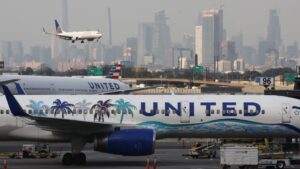Turbulence in the Skies: U.S. Airline Stocks Facing Economic Headwinds
As economic uncertainties loom, the U.S. airline industry finds itself in a precarious position. Recent reports indicate that airline stocks have plummeted to their lowest levels since late last year, following troubling economic data that has shaken investor confidence. The timing of this decline could not be worse, as the travel sector was previously seen as a beacon of resilience in consumer spending.
Economic Factors at Play
The concerning trend in airline stocks coincides with new tariffs imposed by President Donald Trump on goods from Mexico, Canada, and China—tariffs that could lead to higher prices for consumers. Executives from major retailers like Best Buy and Target have warned of the trickle-down effects of these tariffs, indicating a potential squeeze on consumer purchasing power, which could impact discretionary spending, including travel.
United Airlines, particularly vulnerable due to its substantial reliance on the Chinese market, saw stock prices drop by more than 7%. Other major carriers such as Delta Air Lines and American Airlines have also faced similar declines, with their stocks sliding down over 5% amidst midday trading.
The Numbers Speak Volumes
Recent data revealed a 0.2% decline in U.S. consumer spending in January—the first drop in nearly two years—which has fueled concerns about how these economic shifts will influence air travel demand. This data, paired with a steep decline in retail sales, raises red flags for the airline industry as it prepares for the critical spring travel season.
Analysts Weigh In
Experts are grappling with the implications of these economic indicators. Deutsche Bank noted in a recent analysis: "While we remain constructive on the supply backdrop, which still appears favorable, our focus has shifted toward what seems to be an emerging economic ‘soft patch.’ The extent of this impact on air travel demand remains unclear, but it’s likely to influence the domestic discretionary segment."
Interestingly, the bank has observed no signs of weakness in corporate travel or long-haul international journeys. This could indicate that while leisure travel may be sensitive to pricing, business travel remains robust—an essential insight for investors considering the dynamics of airline stocks.
What This Means for Travelers and Investors
For travelers, this economic turmoil could translate into fluctuating ticket prices as airlines adjust to changing demand. Passengers may find deals if competition intensifies, but the reality of rising costs due to tariffs could also mean higher fares.
For investors in the airline sector, the situation demands careful navigation. Opportunities may arise as some stocks dip, but understanding the broader economic landscape is crucial. Businesses like United Airlines indicate that leisure travel remains strong, suggesting that even amid economic concerns, there is still a market for air travel—albeit contingent on consumer confidence.
Moving Forward
As the spring travel season approaches, industry stakeholders and investors alike will be closely monitoring spending trends, corporate travel demand, and potential shifts in consumer sentiment. Those who stay informed of these rapid developments—like our community at Extreme Investor Network—will be better positioned to make strategic decisions.
Stay connected with us for real-time updates and expert insights on market dynamics affecting the airline industry and beyond. Understanding these fluctuations is key to navigating your business investments in the ever-evolving landscape of global travel.

